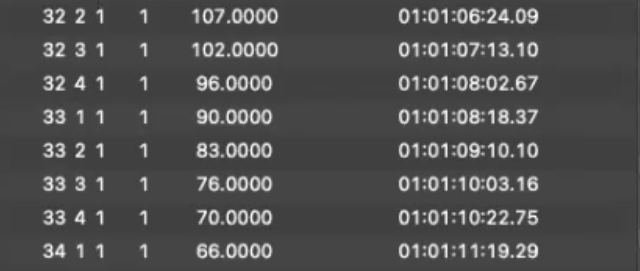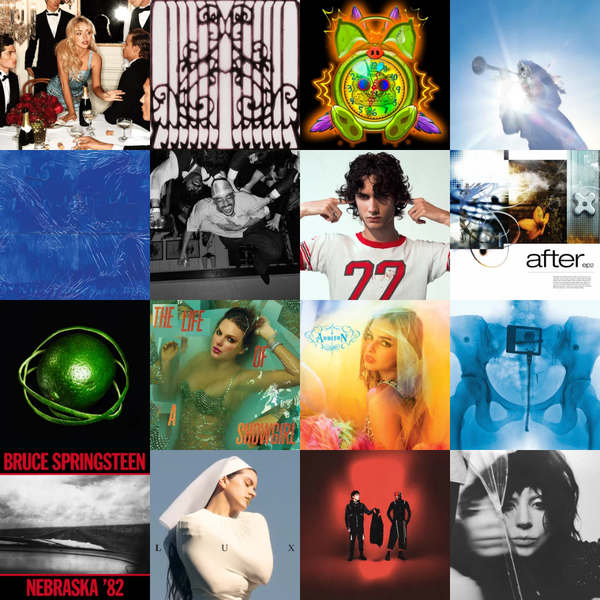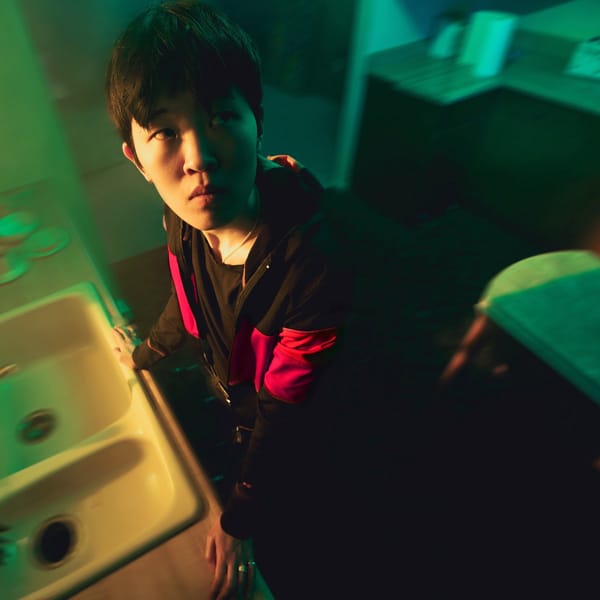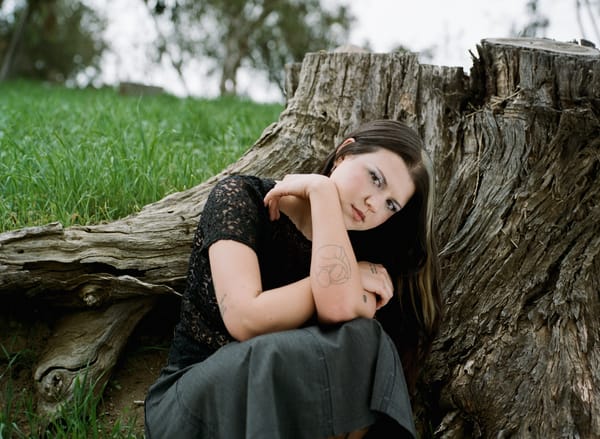Nothing Deep To Say #1: Breaking Apart The Parts I Dread with Pictoria Vark and Gavin Caine
The musician Victoria Park cold-emailed me in January 2022, asking me to listen to their debut record as Pictoria Vark, The Parts I Dread. The record depicts the emotional turmoil following their family’s abrupt move from New Jersey to Wyoming. I immediately connected with the record’s themes of searching for identity, and four months later reviewed the record for Pitchfork. I was also struck by the production, which didn’t sound too far from more established contemporaries like Soccer Mommy and Squirrel Flower, as well as Park’s talents with crafting dynamic, thoughtful indie rock songs.
Following the album’s release, there was a groundswell of support for Vark from other online DIY musicians, fitting for an album where the only respite from constant change is friendship. Pictoria Vark would go on to support emo legends La Dispute, gay icons Tegan & Sara, future newsletter guests Tommy LeFroy, and too many others to list. Vark has since moved to Chicago, part of a musically dexterous scene that includes acts like genre-hopper Nnamdi and the great freak-folk duo FINOM.
After meeting Gavin Caine at Pictoria Vark’s one-year-anniversary show in Brooklyn, I started brainstorming the idea for this newsletter (more on the background here). I moonlight as a mixing engineer myself, and I want to learn from other people that I admire – the people I admire are often other indie musicians, making professional-sounding music without a huge budget. And I didn't want to pry into their personal lives, as that proved exhausting in the past.
I was thinking of calling this interview series a few different things, but I ultimately decided on a line from Pictoria Vark themself – “Good For” features thirty people (recruited from Twitter) yelling the line “THERE’S NOTHING DEEP TO SAY”! And that’s a perfect title for a space where queer musicians can talk about their music, rather than having to go deep. When some of these upcoming interviews do talk about identity, but it’s an organic outgrowth of the music. The Parts I Dread is a great-sounding, endearing record about accepting drastic change, made almost entirely with stock plugins and a drum setup in a basement – that invention perfectly encapsulates the spirit of this newsletter, and it’s why they and their producer Gavin Caine are the first guests.

INTRO:
How did the two of you meet?
Victoria: We met doing a music program after school when we were both 10, but we were both really shy as kids. So even though we knew each other from the jump and were in bands in middle school, I don't think we became friends until we were 12 or 13.
Gavin: There was definitely a solid two or three years of us knowing each other and being together all the time before we actually said anything to each other.
Gavin, how did you get into production?
Gavin: I don't know when I started, but I think at some point I just started making little recordings at home and just. When I was about 16 or 17, I realized this was totally sick and I want to do this forever. And the first actual project I did was with Vicky and our friend Jason who plays on The Parts I Dread also. And that was in 2018 and we made two EPs. We made a Vicky EP and we made a Jason EP. And those were the first opportunities that I had to produce. So Vicky and I have been tied together since the beginning.
Victoria, you mentioned in the Record Process podcast you didn’t write a song until well into high school. When did you decide you wanted to start recording those songs? Talk about realizing Oh my God, I have an album.
Victoria: I started writing songs really late as it goes, it was something I was interested in doing but felt really shy about because I didn't consider myself to be a very good singer. When I was four and I was taking piano lessons, I wasn't really interested in a lot of the material, but I did bring a stuffed animal every week. My piano teacher and I wrote these little songs about the stuffed animals, and we made a little book of the songs.
I didn't really think about wanting to write my own stuff until senior year of high school. Gavin and I actually played a show together in New York for my friends. I think it was his album release. I forgot the venue, but I remember Gavin played one of his first originals. I played one of mine. And the rest were all covers and, neither of us ever released those songs.
But it was the start of us playing our original music in front of other people. I felt shy about my voice as a producer as well, even now as we're working on another thing. I don't need to be the singular mastermind genius behind something. I just want it to be good. And I think being able to be open to other people's collaboration and input to make the best thing possible is one of my strengths.
Gavin, is this the first full length you've produced?
Gavin: I think so. I was actually trying to remember that before. If it wasn't the first, it was either, it was probably the second, but I honestly don't know. I think I may have made a solo record for myself in, or I've made two records on my own, but I don't think those count.
Victoria: It was the first record for another person besides yourself.
Gavin: That’s the thing I want to add to that is that it was also the first record that was held to a standard for sure, because all the stuff I make for myself is just I'm just throwing stuff together, whereas this was much more intentional and much more deliberate.
RECORDING DURING COVID:
Can you talk about recording via COVID?
Victoria: I remember when we were first talking about it, we were, maybe, because I feel like the COVID logistics were a lot of how we made some of these decisions because it was the Delta variant and I remember we were like, maybe we can quarantine together at Gavin's family beach house, and we can make the record there in a month. But I didn't feel comfortable flying because of the Delta variant, so we decided, so we decided we could still make it virtually and have fun. I'll pass it to Gavin to talk about more of the logistics because you did a lot of file management for this.
Gavin: I honestly think you were the queen of file management. Once we decided to do it remotely, where everyone was doing it themselves, the real thing that we were up against was just making sure that things sounded cohesive, and for that we needed the drums first. And that was my job. So we made some sort of calendar where we started with the drums and then everything was staggered over a few days. And then Vicky would do the bass three days later. So let's say, on January 1st, I would do the drums, on the 3rd, Vicky would do the bass, and on the 6th, Jason would do the guitar. And we set up a schedule for each song. So that by the time it all wheeled around, it was layered, in a rhythmically good way. So that was the big logistic battle. But it ended up working out fine!
Victoria: It didn't feel nuts until vocal tracking, which took way longer. We also had a restricted time period where we were all super free because it was the month long winter break that we both had for college. So that allowed us to have just the full focused time to work on it. We woke up, got on zoom to check in at 9am and then we would all spend the rest of the day tracking.
We were super on top of making that happen. And then I remember the reason why we were able to do this without a lot of having to rework a whole ton of things is because we built it up from the voice memo I had into these big, fuller band demos, where we had a main guitar part, drums, bass, vocals, just to get a miniature version of Oh, do we like this part? Do we like the dynamics?
So we wanted to get a lot of that out as much as possible in that demo phase. And obviously we added way more layers. So many layers! And it also helped that we had all been playing together for so long.
Gavin, you did all the non-bass instrumentation, right? Except for Jason (Ross, of Moon Sand Land.)
Gavin: Jason definitely did the main guitars that you hear, for the most part, I would say. Any lead guitar, any solo, anything that is really awesome was Jason, and then anything that was more patchwork was me. Vicky and I were calling all the time. It was all remote, but we may as well have been [in person] because we were on either the phone or zoom at least two or three times a day. Vicky would be like, I hear this thing, and I would play it and send it to her and she'd be like, No, not quite. And then we'd been working together all the time, even though we were in different states.
Oh, no, that takes me back to early lockdown!
Gavin: It's definitely a product of its time.
“WYOMING” BREAKDOWN:
THE DRUM MACHINE:
Gavin: In my basement. There's a little closet that has a washer and a dryer and I just stuck it there. I recorded it, and then Vicky tracked her bass, and Jason tracked his guitar. I definitely remember feeling at some point along the way the verses had to sound like a drum machine, and that there was just a certain tightness, and I felt that's what I was replicating. In my drumming it almost became in an uncanny valley where it was not quite a drum machine but it was trying to be, so we ended up actually redoing it. But at the time, I had no idea how to do this, and I wanted to just sample my drums. I had them all laid out and then copied and pasted them, and arranged them on the grid. It was the best idea I had at the time, and it worked.
Victoria: We also did it because it came from a real drum sample that we took, and then we got to Gavin, who manipulated all of them to make these different sounds. And I do remember when we first had the drum machine idea, Gavin was trying to use our original bass and guitar parts that we recorded to the full drum kit, and trying to get these takes to line up, because we used them at the same tempo. But we ended up having to re-record bass and guitar to fit the drum machine because I think we were still working with the cadence of the full drum kit.
Gavin, I noticed that you have a Space Designer plugin on one of the tracks. Do you normally just use regular stock plugins?
Gavin: That's all I got. I've tried getting other plugins before, but there's something about the interface of them that I don't know. I'm not the most tech savvy guy, especially on the computer. Maybe because you can tell with [the drum machine] being my best idea.
THE CHORUS
How did you record the live drums?
Gavin: There's four mics, SM57 on the snare, tale as old as time. I only have a femics. I actually think I only have four mics, so I think I used all four. I have the 57, which I put on the snare. I have the little Shure small diaphragm condenser mics, [SM137s]. I put those on the overheads and then - this is definitely a weird move, but the other mic I have is [condenser mic] AKG C214, which I actually put on the kick just because I don't have any other mics. And that is the setup!
Gavin: What's so sick about Vicky's writing with this one is that it’s two songs that are fighting.
Victoria: When I wrote this, I was really inspired by "Sleepwalking," the Better Oblivion Community Center song, where it’s lowkey and slow in the verse, and fast and loud in the chorus. Some of the feedback I've gotten from this song of people who don't really like it as much, they're like, “the groove is so good and then it's whiplash” and I'm like, yes, that's the feeling. But the interesting thing is the outro is two bpm slower than the verses.
Victoria: Gavin had the grand vision of how we were gonna do this in the mixing portion; Jason and I would record the verses and it would slow down, and then we would stop recording before the chorus, and then before the chorus we would also record from that slow down into the chorus.
Gavin: Wee crossfaded all of the guitars, and all the bass. And I think we maybe crossfaded the drums too? The drum machine slows down too, at the end. That's only possible with that tempo grid. I would never have dragged all that stuff around. Otherwise, I think I would have lost my mind.

Gavin: The instrumentation for the chorus is just classic guitar, bass and drums. And so Jason sent me just his tracks recorded with a Big Muff fuzz pedal. So there's a track labeled “gross guitar.” I think Jason sent me this and then I did my own sounds of a big muff and then I made this guitar that I guess sounded gross. That's not that gross. And then those three layered together made the main guitar sound. And for the most part, they're all in unison. And there’s a track with the same chords, but also through a hard tremolo because long sustaining chords can get stagnant real quick.
THE MITSKI SAMPLE
You told me there's a secret Mitski sample in the second chorus.
Victoria: No one I know has picked it up from the recording; it doesn't sound like anything unless you're listening for it. I also want to sample Geyser in the background because it's the answer/joke of the line “why'd you take her literally?” meaning, why did you take Mitski literally when she meant Be The Cowboy metaphorically? Literally moved to Wyoming! It's a joke for myself and for Gavin. We sampled it from a live recording so it's not from the record. We didn't want to get sued, we just wanted the vocal. I didn't extract it. I don't know how to do that.
I'm pretty sure you've tweeted about Mitski comparisons before - I interpreted it as a wink towards that.
Victoria: There's definitely some of that. And obviously I love her music so much. I have a lot of respect for her, but I think our ideas and methods of writing and how we sound are very different. I am not nearly as good a vocalist as Mitski, and I can do laps around her bass, technically.
Gavin: I don't know if this is true anymore, Vicky, but we wanted things to just constantly be really full and moving. And I personally did not have enough technical expertise to make very simple things sound full. There's so many albums that are just drums, bass and piano or guitar and vocals. And it's the fullest, biggest record. I may still not know how to do that and at the time I definitely didn't, so we just compensated by adding everything.
Thank you to Pictoria Vark and Gavin Caine! Subscribe to the paid tier for bonus content, like a breakdown of "I Can't Bike"'s outro, Park's upcoming work with Half-Gringa, and the importance of tambourines!



